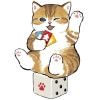🎤 Interview with Naoki Sekino
2024年 4月 24日
We spoke with Naoki Sekino of the board game shop Asobiba about what it’s like working together with the rest of the shop staff to create the word-association card game, SIGN!
English (translated)
Translated by Renkon
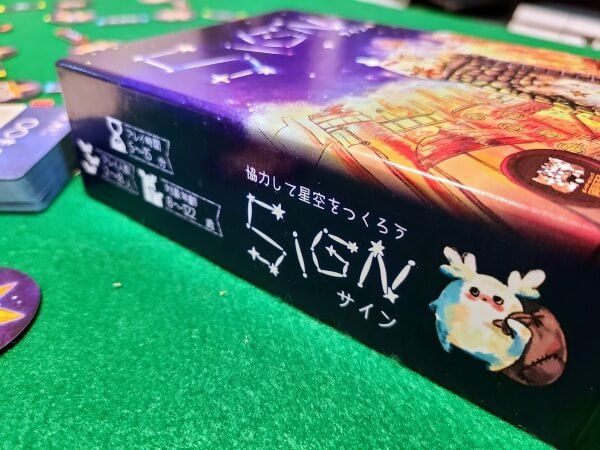
(2023) SIGN
# Please tell us a little bit about yourself.
My name is Naoki Sekino, and I run the board game shop Asobiba. This shop opened three years ago.
# How did you get started making games?
For a while, our staff had been thinking about making a game together, but we thought that if we could make games together with some of our regular customers, we would have a lot of ideas and fun! So that was the start of our team doing exactly that.
# Can you tell us about some of your favorite games and genres?
I like so-called heavy games like Brass: Birmingham and Agricola. I also like auction games and economic games.
# Can you tell us a bit about the board game café Asobiba?
It is a board game shop located in Kanagawa Prefecture, Fujisawa City, Shonandai, and you can play, buy, and enjoy board games at Asobiba. Last year, we created our own game for the first time and published SIGN. We are closed on Mondays and Tuesdays, but we are open from 13:00 to 22:00 on other days and on holidays.
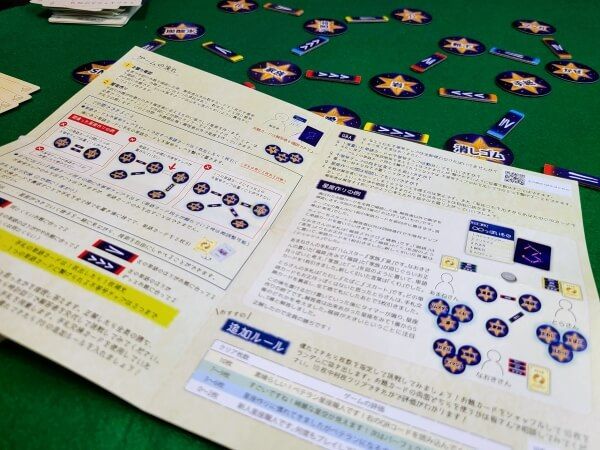
# Whenever we go to Asobiba, the staff there are always happy to go over the rules of the games with us. Do you have to learn all of the rules for all of the games in your store?
We know them all perfectly! Well, maybe not quite, but I do have the basic gist of them. Every day we open new games to play, and our regulars often leave us with more new games to check out, so it’s pretty tough to keep up.
# Please tell us about SIGN!
SIGN is a cooperative board game where players make a starry sky. Everyone besides the solver plays Star Cards with different words written on them and tries to match them with that round’s theme. By connecting the Star Cards with chips marked with symbols like “greater than,”, the players can communicate to the solver which of these words is closer to the theme. After players put together the constellation in two minutes, the solver gazes at the starry sky and guesses the correct answer. How many messages, or signs, will you be able to solve?
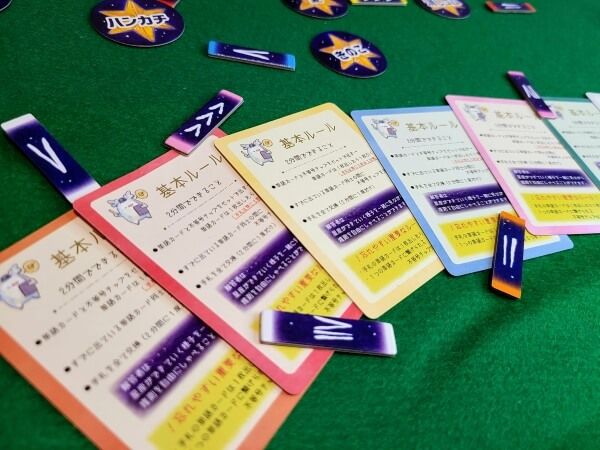
# Can you tell us about the process of making SIGN? Was it different from the way you approached making your other games?
Since we were working as a team, first we all came up with ideas. After doing a lot of playtesting, we voted on the best games, and started production on the one that received the most votes. At first, SIGN was a ranking-style valuation game, but after doing many test plays, we brought it closer to its current form. At the time, the game used a train motif, but we changed it to constellations so that more people could play.
# How long did it take to think up SIGN and then bring it to market? What was the most difficult step?
It took about a year after we first landed on the concept. The hardest part was that we were working as a team, so the more opinions we gathered, the harder it was to sort out which ones to go with. It was tough.
# What was your greatest influence when making SIGN?
We took inspiration from cooperative games such as ito and Just One.
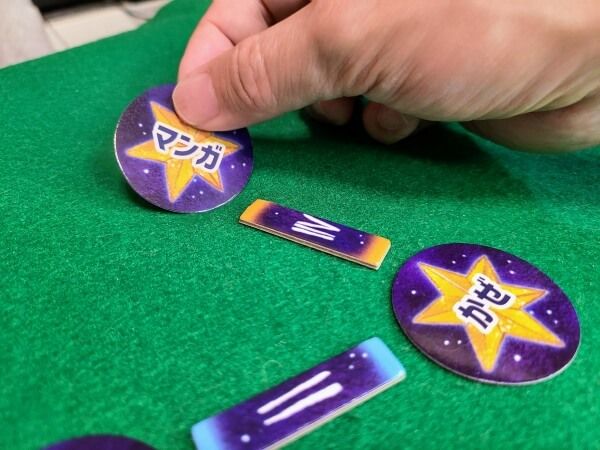
# What was the most challenging part of making SIGN?
The most challenging part was deciding how many copies to print. At first, we thought we could produce a small lot of about 50 copies. But if we did, it would cost 5 to 6,000 yen to print each set, which would mean the selling price would be even higher, so we were forced to print much more. Printing more copies meant we had to confident that our game was worth it, so that made us quite nervous.
# When making SIGN, how did you select what to use for the Word and Theme Cards?
When thinking up words or during playtesting, we would say, “This might be a good word,” and that’s how we chose them. As for the themes, everyone on our team came up with words that we could use as subjects.
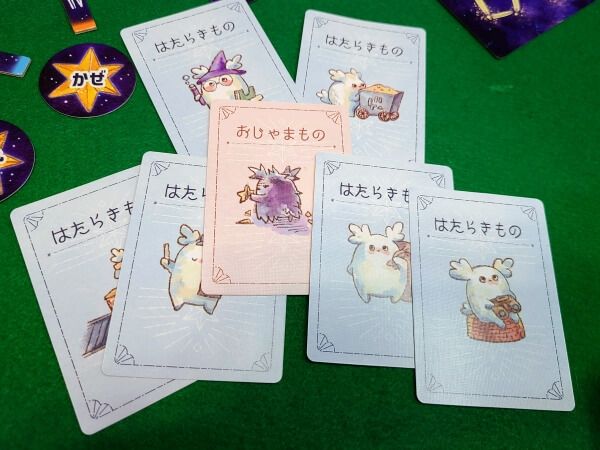
# What has the response been like from the people who played SIGN?
We are very happy to hear that everyone is really enjoying the game. We are extremely grateful that there are some people who play the game and then say, “That was so much fun, I want to buy it!” However, no matter how good the response has been so far, I still get nervous every time I ask people to play SIGN. (laughs)
# Were there any interesting or funny responses you’ve received from players, especially during the playtesting process?
When some customers were playing, the theme was “The current solver has THIS,” and the word satou (sugar) was strongly emphasized. To my surprise, it was apparently because the solver’s family name was Satou. At first, everyone was like, “Why would they have sugar…?” But then, some players who knew were like, “Their name!” and started hurrying with excitement. It was very funny to see.
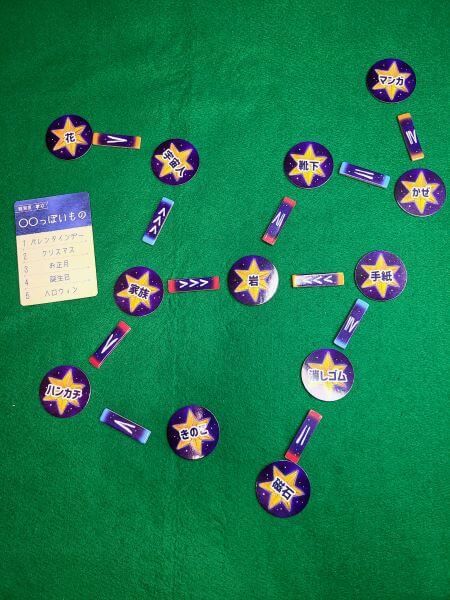
# Is there anything in SIGN to which you want to draw the player’s attention?
One point that we were very particular about was making the finished board look like a starry sky. We have received compliments on how nice it looks. Also, we were particular about making the game so that anyone can enjoy playing it, even those who are not good at speaking freely such as in games that require a lot of improvisation.
# Do you have any board games that you’d like to shout out, especially those made by individuals or small groups? What do you like about them?
I recommend Mob+'s Nana because it is easy to play and can be enjoyed by people of all ages. The cute illustrations were done by Sai Beppu, the same artist who worked on SIGN.
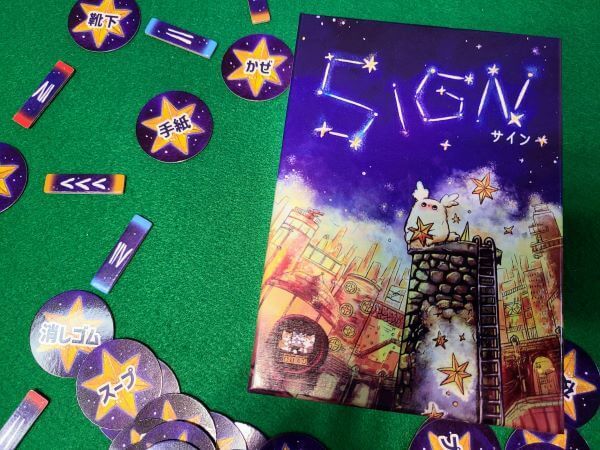
# Do you have any messages for your players?
We are always grateful to everyone who has supported our board game shop Asobiba, and for enjoying SIGN. Board games have a wonderful charm to them. We hope you will continue to enjoy many wonderful board games from all over the world! Thank you for your continued support.
# Thank you for sharing your thoughts with us!
日本語

(2023) SIGN
# 自己紹介してください。
ボードゲームショップあそびばを経営しています、関野直樹です。3年前にボードゲームショップあそびばを作りました。
# ゲーム作りを始めたきっかけはなんですか。
以前から作ってみたいと漠然とスタッフ同士で考えていたのですが、常連様と一緒に作っていけたらアイデアも豊富で楽しそう!と考えて常連様と一緒にゲームを作るチームを結成したことがきっかけです。
# もしよろしければ、ご本人にとって一番好きなゲームや好きなジャンルをご紹介お願いします。
好きなゲームは「ブラス:バーミンガム」や「アグリコラ」などの重量ゲームと呼ばれるゲームが好きです。もしくは競りゲームや経済ゲームなども好きです。
# ボードゲームカフェ「あそびば」について教えてください。
ボードゲームショップあそびばです。 神奈川県藤沢市湘南台でボードゲームが遊べて・買えて・楽しめるお店を経営しています。昨年は初めて自分たちでゲームを作成し、「SIGN-サイン-」を出版いたしました。 月・火曜日は定休日ですが、それ以外の曜日や祝日は13:00-22:00で営業しております。

# 私たちが「あそびば」に行くと、いつも丁寧にゲームのルールを教えてくれますが、お店にあるゲームのルールをすべて勉強したりするのですか。
全て完璧!とまではいかないですがある程度は把握できています。日々、新しいプレイ用のゲームを開封したり、常連様が色んな新しいゲームを置いていってくれたりするので中々追いつくのに必死です。
# この度の「SIGN」という作品についてご紹介お願いします。
SIGNは、星空をつくる協力のボードゲームです。 解答者以外のみんなでさまざまな単語の書かれた『星のカード』をお題に沿って場に出していきます。 星のカード同士を不等号チップで繋げる事でどちらの単語の方がお題に近いのかを解答者に伝えることができます。 2分間で作られる星空を眺めながら解答者は正解を推理していきます。 何枚のメッセージ(SIGN)をみなさんは正解することができるでしょう。

# 「SIGN」を作るときに、どのようなプロセスで作成しましたか。他のゲームを作るときと何か違いがありますか。
チームで作っていたため、まずはゲームの案を全員で出し合いました。 テストプレイを何回も重ねて、良かったゲームに投票をし、一番票が集まったものを商品化しました。 最初はランキング系の価値観ゲームだったのですがそこから何度もテストプレイを重ねて現在の形に近づきました。当時は電車がモチーフのゲームでしたが、そこからよりたくさんの方に遊んでいただけるように星座モチーフに変えました。
# 「SIGN」のゲームを作り始めてから発売に至るまで、どれくらいの時間がかかりましたか。最も大変だったことは何ですか。
最初に構想を作ってからは1年ほどかかりました。一番大変だったのはチームで動いていたため、意見がたくさん集まる分、どの意見で行くかまとめるのが大変でした。
# 「SIGN」を作成するにあたり、最も影響を受けたものは何ですか。
「ito」、「ジャストワン」などの協力ゲームは影響を受けました。

# 「SIGN」を作成するにあたり最も挑戦したことなどはありますか。
最も挑戦したことは印刷部数です。当初は50部ぐらいの少ないロットで製作しようと思ったのですが、50部では1つあたりの原価が5〜6千円などになってしまい販売価格が高騰してしまうためたくさん刷る必要がありました。たくさん刷るということは、よりいいゲームにしようという気合いも入りましたし、緊張もしました。
# 「SIGN」に用いられている言葉や、出題テーマはどのように選定しましたか。
言葉やテストプレイを重ねていく中で「こういう言葉があったらいいかも」という言葉を選びました。お題カードはチーム全員でお題になりそうな言葉を出し合いました。

# あそびばで「SIGN」をプレイする方もいらっしゃるかと思いますが、プレイされた方の反響はどうですか。
みなさまとても楽しんで遊んでいただいていてとても嬉しいです。プレイされた後で楽しかったから購入したい!と言ってくださる方もいらっしゃってありがたい限りです。 しかしいくらいい反響をいただいていても、毎回SIGNを遊んでもらう時は緊張します。笑
# 制作時のテストやお客様のプレイの中で印象的な回答や面白い展開などの経験があれば教えてください。
お客様が遊ばれていた時に、「今回の解答者が持っている」というお題で「さとう」という単語をとても強くしていたのですが、なんと回答者の方の苗字が佐藤さんだったそうです。 最初はみんな「なんで砂糖を持ってるんだ・・・?」という雰囲気になっていましたが名字か!とわかった人たちがざわざわしていたのがみていて面白かったです。

# 「SIGN」において、プレイヤーに伝えたいこだわったポイントなどありますか。
こだわったポイントは完成した盤面が星空のように見えるようにしたことです。見栄えが良いことはとても褒めていただけます。また、大喜利ゲームなどで自由に発言するのが苦手な方にも楽しんでいただけるように、いろいろな方が遊べるようにこだわりました。
# おすすめのボードゲーム(特に個人製作)はありますか。おすすめのポイントも教えてください。
MoB+さんの「ナナ」は手軽にできて老若男女楽しめるのでオススメです。可愛いイラストは「SIGN」と同じ、別府さいさんが手がけています。

# プレイヤーの皆さんへ何かメッセージがあれば一言お願いします。
ボードゲームショップあそびばを応援していただいている皆さん、「SIGN」を楽しんでいただいているみなさん、いつもありがとうございます。ボードゲームはとても素敵な魅力があります。これからも世界中のたくさんの素敵なボードゲームを楽しんでいただけますと幸いです!これからも応援よろしくお願いいたします。
# この度はインタビューにご協力いただき誠にありがとうございます。
